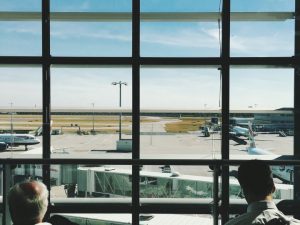
Now What? Careful Adjusting after a Life-changing Trip
Reading “The struggle to return home” by Richard Stupart on the Matador Network last week had a profound impact on me.
I have been to Uganda. I have been where Richard has been. I held children made orphans by the LRA, little ones whose eyes had seen things reserved only for my darkest nightmares. I watched them smile and laugh in the midst of so much pain.
I remember coming home, standing wide-eyed and speechless in the airport as I listened to a woman yell at a hot dog vendor for forgetting pickles on her foot-long chili dog. I was flabbergasted. Disgusted.
How do you go from being surrounded by people with nothing who cherish everything to people with everything who cherish nothing? More than that, how do you make others understand the incredible incongruities between here and there? It was terrifying.
What’s even more terrifying, as I look back now, is how the feeling fades. How, after months and years, the things that seem so clear to you become hazy as you lose yourself once again in the day-to-day monotony of working life.
How do we sustain our convictions? How do we change?
I recognize there is no easy fix or secret formula. But here are a few things that have helped me after returning home from trips abroad:
When you first get home:
Give yourself time.
Realize it’s okay to feel the way you feel – confusion, sadness, anger, loneliness, guilt, depression. You need time to process these emotions and to make sense of your experience. Don’t expect it to happen over night, and don’t rush yourself. This especially goes for any lifestyle changes. After returning home, I felt tempted to sell all of my shoes and quit eating out. But if I’d made that decision right away, my primary motivation would have been guilt. You need sufficient time to adjust and find balance as you determine the things that are most important to you.
Write.
Journaling is an excellent way to organize your thoughts without a filter. As Richard commented, writing can often be a cathartic experience. If nothing else, you will be able to record your thoughts and emotions so that you can come back to them later. Even though I’m a horrible poet, I found myself writing lots of poetry after I returned from my trip and found that artistic expression was extremely valuable to me in giving life to my deeper emotions.
Connect with others.
When you’re ready, reach out to those who have had similar experiences. The questions you’re holding now are too large to conquer on your own, and you’ll need others for support. Try to find one or two people who have been through a similar adjustment and stick with them.
After life is back to relative normal (weeks or months later)…
Reevaluate.
Now that some time has passed, which realities from your trip are still on your mind? Certainly you will not be able to act on every emotion or impulse that struck you while abroad, so the things that remain heavy on your  heart are a good indicator of where you should take action.
Integrate your new convictions with your goals and passions.
Little things count! For me, as a writer, my experience abroad solidified in me the desire to honor people and their stories, to write and create with the utmost respect for the complexity and intrinsic value of humanity. But maybe you’re not a writer – maybe you’re an accountant or a landscaper, maybe you love children or are passionate about fishing. How can you integrate your new convictions into the areas that matter most to you? If you can figure this out, the likelihood of real change is high. But please…
Realize change is a lifelong process.
It’s easy for me to get discouraged seeing how similar my life looks B.T. (before trip) and A.T. (after trip), which causes me to doubt the validity of my experiences and convictions. Don’t do this! This is only one part of your journey, one part of life that is shaping who you are and who you want to be. There is much more to come.
Please read Mr. Stupart’s article and reflect on how your own experiences traveling or volunteering abroad affected you once you arrived home. I would love to hear your thoughts.










